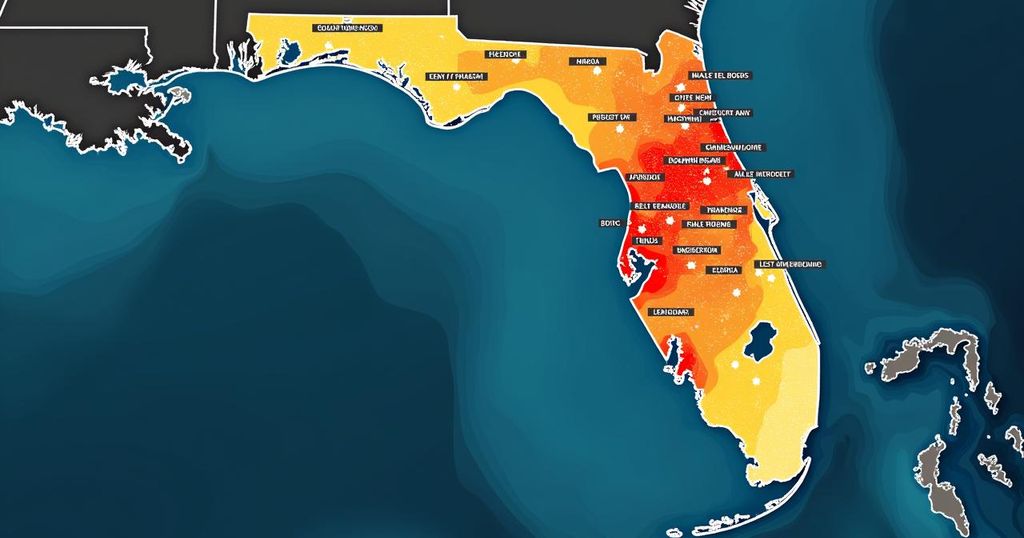Hurricane Helene: Impact and Response in Florida
Hurricane Helene hit Florida as a Category 4 storm, causing extensive damage and at least 13 fatalities within the state. The storm weakened to a tropical system by Friday morning, and emergency responses were swiftly initiated, including search and rescue efforts and federal assistance. Moreover, widespread power outages affected numerous states, further illustrating the storm’s extensive impact.
Hurricane Helene made its landfall in Florida’s Big Bend region on Thursday night, initially striking as a formidable Category 4 hurricane. However, the system rapidly weakened to a tropical storm by Friday morning, with its remnants progressing into Kentucky. As indicated in the final advisory released by the National Hurricane Center on Friday evening, Helene has ceased to be classified as a tropical system. Tragically, the storm has been linked to at least 105 fatalities, with 13 confirmed in the state of Florida—ten in Pinellas County, two in Hillsborough County, and one in Dixie County. At approximately 11:10 p.m. EDT Thursday, Helene made landfall roughly ten miles west of Perry, Florida. The hurricane’s ferocious winds resulted in power outages affecting more than one million homes and businesses throughout the state. Additionally, millions more across Georgia, Virginia, and the Carolinas were left without power on Friday. As a precautionary measure, emergency declarations were made by the governors of Florida, Georgia, Alabama, the Carolinas, and Virginia. All coastal watches and warnings were lifted by Thursday afternoon. The impact of Helene was particularly severe in the rural Big Bend area, which comprises mostly small fishing villages and vacation spots. Reports of damage have surfaced extending hundreds of miles north, with instances of flooding reported as far away as North Carolina. Eyewitnesses posted videos showcasing sheets of rain and significant structural damage in Perry, where residents expressed their heartbreak over the destruction. “It is really heartbreaking,” stated Stephen Tucker, lamenting the loss of progress following last year’s Hurricane Idalia that had necessitated repairs to a church roof that was recently replaced. In light of the devastation, Florida Governor Ron DeSantis remarked that the damage from Hurricane Helene appears to surpass that inflicted by the combined effects of Idalia and Debby from the previous August, describing the situation as “demoralizing.” In response to the crisis, President Joe Biden expressed his prayers for those affected while the Federal Emergency Management Agency (FEMA) dispatched over 1,500 personnel to assist in recovery efforts, leading to 400 rescues by Friday morning. Local officials rapidly deployed boats to reach stranded individuals while issuing warnings about potential hazards in the floodwaters, which could contain live wires and other debris. The Citrus County sheriff’s office cautioned, “If you are trapped and need help please call for rescuers – DO NOT TRY TO TREAD FLOODWATERS YOURSELF.” The Florida Fish and Wildlife Conservation Commission has organized search and rescue boats in the worst-hit counties of Dixie and Taylor, supplemented by additional teams dispatched to assess the damage across adjoining regions. The law enforcement and emergency teams along the west coast have galvanised efforts to conduct search and rescue operations for any residents trapped by rising waters. Governor DeSantis had declared a state of emergency for 61 out of Florida’s 67 counties ahead of the storm’s arrival, while President Biden had approved an emergency declaration for Florida shortly thereafter. This designation enables FEMA to coordinate disaster relief efforts, offering comprehensive support for evacuation and shelter services. On Saturday, President Biden further approved a disaster declaration, facilitating federal assistance to bolster state, tribal, and local recovery initiatives in the areas impacted by Helene. In preparation, federal authorities deployed generators, food, and water, alongside search-and-rescue teams to provide vital aid to those in distress. Additionally, Governor DeSantis activated the Florida National Guard and Florida State Guard to amplify recovery efforts in the aftermath of the storm. Several counties in the state’s west and northwestern areas enforced evacuation orders, resulting in the closure of schools, offices, and businesses as Helene advanced through the Gulf region.
Hurricane Helene struck Florida on September 14, 2023, as a Category 4 hurricane before weakening significantly as it progressed inland. Its destructive path led to widespread casualties and power outages, prompting an immediate emergency response from state and federal authorities. The storm’s impacts were particularly severe in the sparsely populated Big Bend area, where infrastructure is vulnerable to such powerful weather events. Collectively, the severe weather consequences resulted in extensive search and rescue operations led by various agencies and highlighted the need for preparedness and robust emergency management strategies in facing extreme storm events.
In summary, Hurricane Helene caused significant destruction and loss of life as it transitioned from a Category 4 hurricane to a tropical storm upon landfall in Florida. The collective response from state and federal agencies underscores the severity of the situation, emphasizing the need for prompt recovery efforts and continued vigilance against potential flood hazards. Governor DeSantis and President Biden’s actions reflect the grave nature of the disaster, with extensive emergency declarations and resources mobilized to assist affected communities. The storm has served as a reminder of the devastating power of hurricanes and the importance of preparedness for such natural disasters.
Original Source: www.cbsnews.com




Post Comment